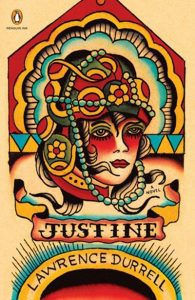 Lawrence Durrell’s Justine, the first in a series of novels known as the Alexandria Quartet, begins at the ending, with our unnamed narrator on a Greek island, reflecting on the events that left him marooned with a child and no wife, his life upended. He had been living in Egypt, in the city of Alexandria, sometime before the outbreak of the Second World War, and what he offers, in sharing his retrospective, is a portrait of one of the world’s oldest cities and the people inhabiting it.
Lawrence Durrell’s Justine, the first in a series of novels known as the Alexandria Quartet, begins at the ending, with our unnamed narrator on a Greek island, reflecting on the events that left him marooned with a child and no wife, his life upended. He had been living in Egypt, in the city of Alexandria, sometime before the outbreak of the Second World War, and what he offers, in sharing his retrospective, is a portrait of one of the world’s oldest cities and the people inhabiting it.
Justine is a love story, albeit a complicated one: our unnamed narrator is scanty in the details he provides, and doesn’t have much use for chronology (“for that is history”); instead, he delves in and out of sequence, relating details “when they first became significant” to him, and not when we might wish to have them to contextualize the dramatic events. This approach is of a piece with Durrell’s mission in the Quartet, where each novel aims to describe the same events from a different narrator’s perspective, shedding new light on old occurrences – or perhaps revealing to what extent “truth” is a matter of subjectivity. Thus the central plot device: our narrator is a writer, relaying to us experiences not as they happen but as they happened, and attempting to use his art to make sense of these events, for “only there, in the silences of the painter or the writer can reality be reordered, reworked and made to show its significant side.” And significance, it should be noted, is almost by definition a matter of perspective.
The love plot is as follows: our narrator, an aspiring writer and under-worked teacher, who has come to Alexandria on a whim and begun a relationship with a Greek prostitute, has an affair with the titular Justine, a beautiful young Jewish woman married to a wealthy Egyptian nobleman. Like Cleopatra, that other great seductress of Alexandrian fame, Justine possesses a kind of fatal charm irresistible to the men in her life, even those perceptive enough to know no lasting relationship can be had with her. Her husband, Nessim, at first willfully ignorant of her extramarital dalliances, gradually comes unhinged as evidence of her infidelity accumulates, infusing a sense of menace into his budding friendship with the narrator. This perhaps sounds like the plot of a melodrama, but Durrell spares us that by making the city of Alexandria itself – with “five races, five languages, a dozen creeds” – the center of the novel, what one character will call “the great winepress of love” because “those who emerged from it were the sick men, the solitaries, the prophets, […] all those who have been deeply wounded in their sex.” Like Paris, that other great attraction to expatriates, Alexandria acts as a beacon to the lost, attracting bohemians from across Europe and America, as well – in a minor subplot – the intelligence and counter-intelligence communities, who have some suspicion of the war to come. The contrast between the city itself – desperately poor, infested with garbage and vermin, and home to all manner of vice and crime, most despicably child prostitution – and our bohemian characters, who are careless in their wealth and afflicted with the malaise attendant on all hedonists, is shocking, and Durrell seems to relish puncturing the character drama with periodic reminders of the harshness of the city itself. Here, for example, is one of the earliest descriptions of Alexandria:
Streets that run back from the docks with their tattered rotten supercargo of houses, breathing into each others’ mouths, keeling over. Shuttered balconies swarming with rats, and old women whose hair is full of the blood of ticks. Peeling walls leaning drunkenly to east and west of their true centre of gravity. The black ribbon of flies attaching itself to the lips and eyes of the children – the moist beads of summer flies everywhere; the very weight of their bodies snapping off ancient flypapers hanging in the violet doors of booths and cafés. The smell of the sweat-lathered Berberinis, like that of some decomposing stair-carpet. And then the street noises: shriek and clang of the water-bearing Saidi, dashing his metal cups together as an advertisement, the unheeded shrieks which pierce the hubbub from time to time, as of some small delicately-organized animal being disembowelled. The sores like ponds – the incubation of a human misery of such proportions that one was aghast, and all one’s human feelings overflowed into disgust and terror.
Hardly a romantic setting, but the description gives some sense of Durrell’s powers as a writer, and of the ornate – some critics have said overwrought – style of his prose.
Only a quarter of the way through the series, and with just one reading of a book that is constructed in the manner of a jigsaw puzzle, I don’t yet feel confident passing judgment, except to say that with Justine, Durrell has made an excellent case for further reading.